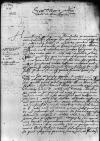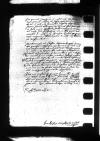Accepi hic plenas in me gratiae Serenissimae Maiestatis Vestrae ⌊⌋ et mandata, quibus illam in contumelia mihi a ⌊Graudnicensibus⌋ illata liquido mihi declarat. Habeo igitur, quas tenuitas mea potest, Serenissimae Maiestati Vestrae immortales gratias. Ceterum cum hi, qui in me deliquerunt, veniam a me petierunt, nequaquam illam eis pro paterno et pastorali meo officio negare potui et spero, quod obsequentiores hinc ecclesiae et mihi filii futuri sint, quam prius fuerint.
cf. Ter. Hau. 77 homo sum, humani nil a me alienum puto ⌊Homines sumus.cf. Ter. Hau. 77 homo sum, humani nil a me alienum puto ⌋ Quae in hoc ⌊conventu⌋ egerimus, Serenissima Maiestas Vestra ex litteris adiunctis fidelium ⌊subditorum suorum⌋ intelliget. Ego quidem, quod potui, praestiti et in decursu septem mensium ter non sine gravibus expensis ⌊conventibus⌋ harum Serenissimae Maiestatis Vestrae terrarum interfui, quod certe in hoc possessionis meae principio non potuit mihi non esse durissimum, cum adhuc in servitio Serenissimae Maiestatis Vestrae debita contracta restant non pauca solvenda, venit etiam res familiaris sustinenda, unde coactus, verecunde tamen, a Serenissima Maiestate Vestra mendicare adigor idque, quod peto, non admodum est magnum et sine magno suo detrimento id ipsum Serenissima Maiestas Vestra sacellano et servo suo praestare potest. Depositae sunt apud me centum et quadraginta marcae Prutenicales leves, quae exactae sunt a pauperibus ⌊meis ecclesiasticis⌋ ratione contributionis proximae. Et cum istiusmodi pecuniae sacrae sunt et fortas sis pretium sanguinis, Serenissimae Maiestatis Vestrae thesauro in tam parvo numero non satis apte conveniunt. Qua de re Serenissimae Maiestati Vestrae humillime supplico, dignetur sacra sacris relinquere et me istis pecuniis in hac mea egestate sublevare, quae non parum mihi sunt profuturae et in illis parum admodum Serenissimae Maiestati Vestrae decedet. Quod ego promereri nequeo, Deus Omnipotens Serenissimae Maiestati Vestrae abunde rependet.
Mortuus est in ⌊castro Marienburgensi⌋ sacerdos quidam intestatus, cuius bona omni iure ad loci ordinarium devolvuntur. Dominus ⌊thesaurarius⌋ Serenissimae Maiestatis Vestrae bona illa retinet, allegans militarem consuetudinem, quod bona illorum, qui intestati moriuntur in ⌊castro⌋, cedere soleant castro, quae quidem consuetudo iuribus ecclesiasticis non debet nec potest derogare. Quapropter causam hanc in decisionem et voluntatis Serenissimae Maiestatis Vestrae sententiam humillime reiecimus. Supplico igitur cum primis nos ex eo dubio resolvere pro sua in omnes incomparabili aequitate dignetur.
Alia non restant, quam quod me humillime Serenissimae Maiestati Vestrae, Domino meo clementissimo, commendo. ⌊Christus⌋ Dominus noster eandem quam diutissime in optima valetudine et omnium rerum felicissimo successu conservet.


